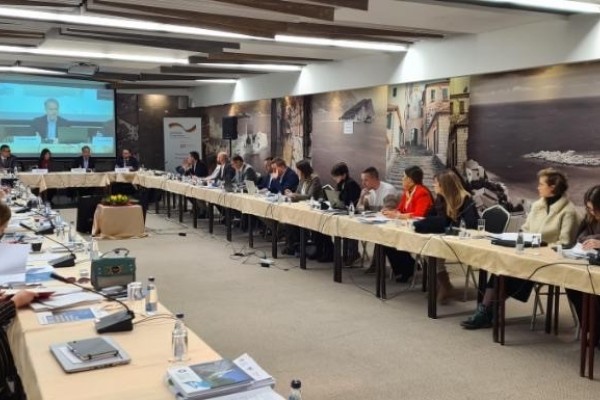
Regional Workshop on Window 1 of IPA III, a great forum of mutual learning and exchange of experiences
ReSPA, in partnership with DG NEAR-EC (European Commission), organized on 09-10 March 2022 a regional workshop dedicated to Window 1 of IPA III “Rule of law, fundamental rights and democracy”. The Workshop made together more than 80 participants (in-person and online) and 9 guests/speakers, mainly from European Commission, EU Delegation to Montenegro, and renowned IPA III experts.
Participants from NIPAC Offices as well as IPA Units in Ministries of Justice and Ministries of Interior from the Western Balkans and Turkey were introduced with the main novelties of the Instrument of Pre-accession Assistance (IPA III) and important elements were explained, such as the policy first approach (which replaces the sector approach), the performance-based approach as well as the necessity to link IPA Programming with National development strategies. EC representatives emphasized that reforms in the Western Balkans in order to happen need strategies (policies), people (public servants) and financial support (among others IPA III). Therefore, strengthening the human resource capacities within IPA Units and ensuring institutional memory is of utmost importance for the proper programming and management of IPA III funds. It was also mentioned that better coordination of donors in the area of judiciary and home affairs is needed in order to streamline the support of the donor community in the Region.
A specific session on how to ensure the quality of Actions proposed to be financed under IPA III was held. Practitioners and experts highlighted that a given action in order to be funded should be relevant/realistic and mature (ready to start implementation), therefore participants were introduced with the way how to check the strategic relevance of the proposed actions as well as their technical maturity. During this session, representatives of the administrations raised their concerns on the extensive use of indirect management delegated to external organizations. Instead of this solution, they stated that implementation of actions should be entrusted to national authorities, which would enhance the capacities of local institutions and staff.
A senior civil servant from Croatia presented Croatian experience in managing EU funds before and after accession. It was highlighted the importance of capacity building process and the impact that EU accession had on civil servants in Croatia. To ensure better quality in those sections of the administrations dealing with the management of EU funds, Croatia introduced, at that time, a specific remuneration policy, and this may serve as a good example for administrations in the Region.
Representatives of the administrations had an interesting session with the Unit in charge of the Rule of Law in DG NEAR. They discussed and brainstormed information related to programming actions under Window 1 for 2023. A mutual agreement was noted related to the main priorities that need to be addressed, such as the fight against corruption and organized crime, freedom of expression and media, functioning of democratic institutions, support to the election process, etc.
A specific session on developing indicators raised lots of interest among attendees due to the challenges they have faced in this regard. Experts from PROMEL project of DG NEAR explained different types of indicators and specific methodologies for using and measuring them. DG NEAR also informed that the IPA III Monitoring and Evaluation Framework will be published by the end of the year.
The last session of the Workshop focused on some tips on mainstreaming the so-called cross-cutting themes, gender equality and green agenda. DG NEAR representatives highlighted that all actions to be financed under IPA III should explain if and how these actions tackle the two cross-cutting themes.
The next Workshop on IPA III (Window 3), will be indicatively held in the last week of April, in Bosnia and Hercegovina.



